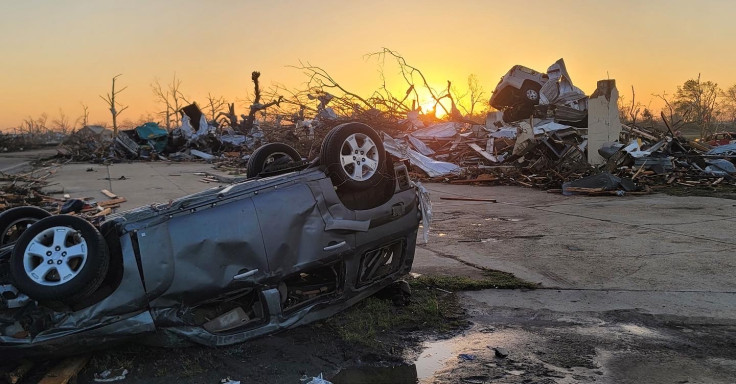
Following the tornadoes that claimed 26 lives in the U.S. state of Mississippi, the governor has warned that more severe weather may be approaching.
According to Governor Tate Reeves, significant threats still exist in several areas of the state.
Following the tornadoes that ripped through Alabama and Mississippi on Friday, Mar. 24, night, hundreds of people have been forced to seek new housing, BBC reported.
Friday's tornado was the deadliest in the state of Mississippi in more than a decade. At least 25 people have died in the state, with one person confirmed dead in neighboring Alabama.
The tornado, which was classified as the second-highest rating imaginable and was classed as "violent," toppled trees, turned trucks into houses and destroyed electrical lines.
On Saturday, Mar. 25, survivors of the disaster could be seen walking around, dazed and in shock. Sunday, on the other hand, has been a hive of activity.
The cleanup process has been assisted by volunteers, some of whom have traveled from Tennessee, Louisiana, and Arkansas, three nearby states. In order to aid in the rescue efforts in some of the worst-affected towns, President Joe Biden has issued a state of emergency and mobilized federal resources.
Crews are working to remove broken trees that are pinning down power lines, with thousands of people losing power during Friday's storm.
People can now get water and sandwiches at stations put up outside some of the few partially surviving buildings. While the local communities struggle to respond, there are forecasts for more powerful storms.
Speaking at a news conference convened in the western town of Rolling Fork, Governor Reeves said, "What we've seen, much like the storm that occurred Friday night, is in the 24-36 hours that are leading up to this afternoon, it appears that the risks seem to be getting worse and worse, not better."
"And when you stand here and see this, what feels like a beautiful weather day in Mississippi, please be aware and please know: if you are south of I-55 in Mississippi today there are significant risks. We are prepared," Reeves added.
The governor said it had been "heartbreaking" to see the loss and devastation caused by the twister, but said he was "damn proud to be a Mississippian" after seeing how locals had responded.
"Because Mississippians have done what Mississippians do," he said. "In times of tragedy, in times of crisis, they stand up and they show up, and they're here to help themselves, help their neighbors."
Surveillance footage shows moment tornado hit Mississippi school https://t.co/m58RbYRjbU pic.twitter.com/zHptSKOQ3r
— BBC News (World) (@BBCWorld) March 26, 2023
The enormity of the destruction in Rolling Fork is still difficult to understand. You can clearly see the tornado's path as you approach the town from the south.
A straight line of trees has been stripped of their branches and uprooted, while others to either side are untouched.
The town's surrounding farmland is littered with debris from the deposition of pieces of buildings and automobiles.
Mayor Eldridge Walker, also speaking at Sunday's news conference, said the town would come back "bigger and better than ever before" to rounds of applause from those who gathered.
"I'm not only just the mayor of this community, but I've lost personal friends," he said. "I'm also the local funeral director - now I'm having to meet those who have lost loved ones and help them make it through."
U.S. Homeland Security Secretary Alejandro Mayorkas visited Rolling Fork, where he pledged to help rebuild stronger buildings.
Mr. Mayorkas said the stronger buildings would prevent the same tragedy from happening again as severe weather events increase in frequency and gravity.
This is Rolling Fork, Mississippi. Catastrophic tornado damage. Almost the entire town is gone. I do not even have the words to describe everything that I saw today. It is a long road ahead for the lovely people we met today. @Chloe_DXM #Tornado #MississippiStrong pic.twitter.com/ztIzVfELO2
— Rose (@901Lulu) March 27, 2023
He earlier pledged to help the people of Mississippi, "not just today but for the long haul".
Although it's uncertain how climate change may affect storm frequency, we do know that higher sea surface temperatures warm the air above and increase the amount of energy that can be used to fuel hurricanes, cyclones, and typhoons. As a result, they are likely to be more intense with more extreme rainfall.
© 2025 Latin Times. All rights reserved. Do not reproduce without permission.



